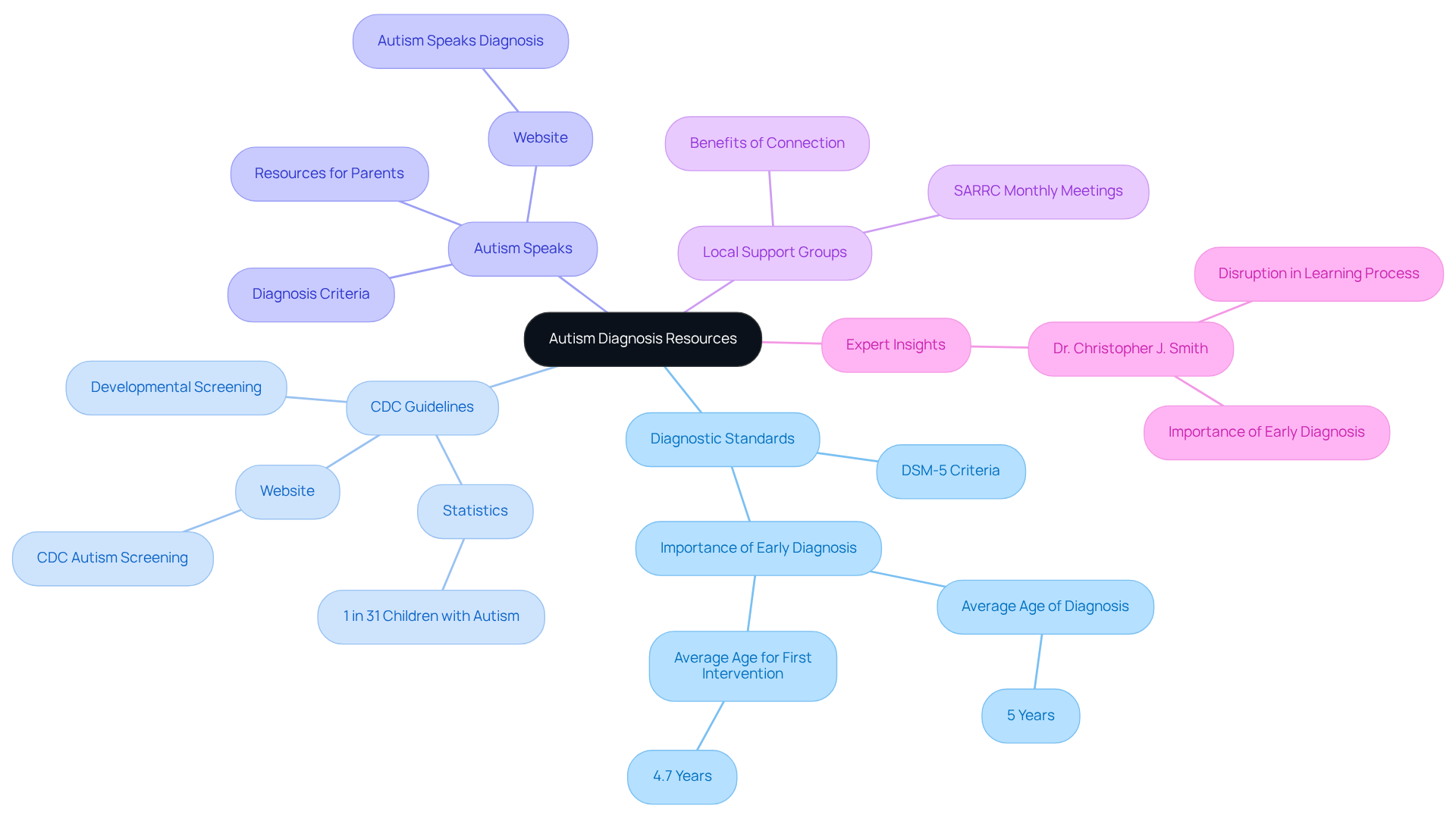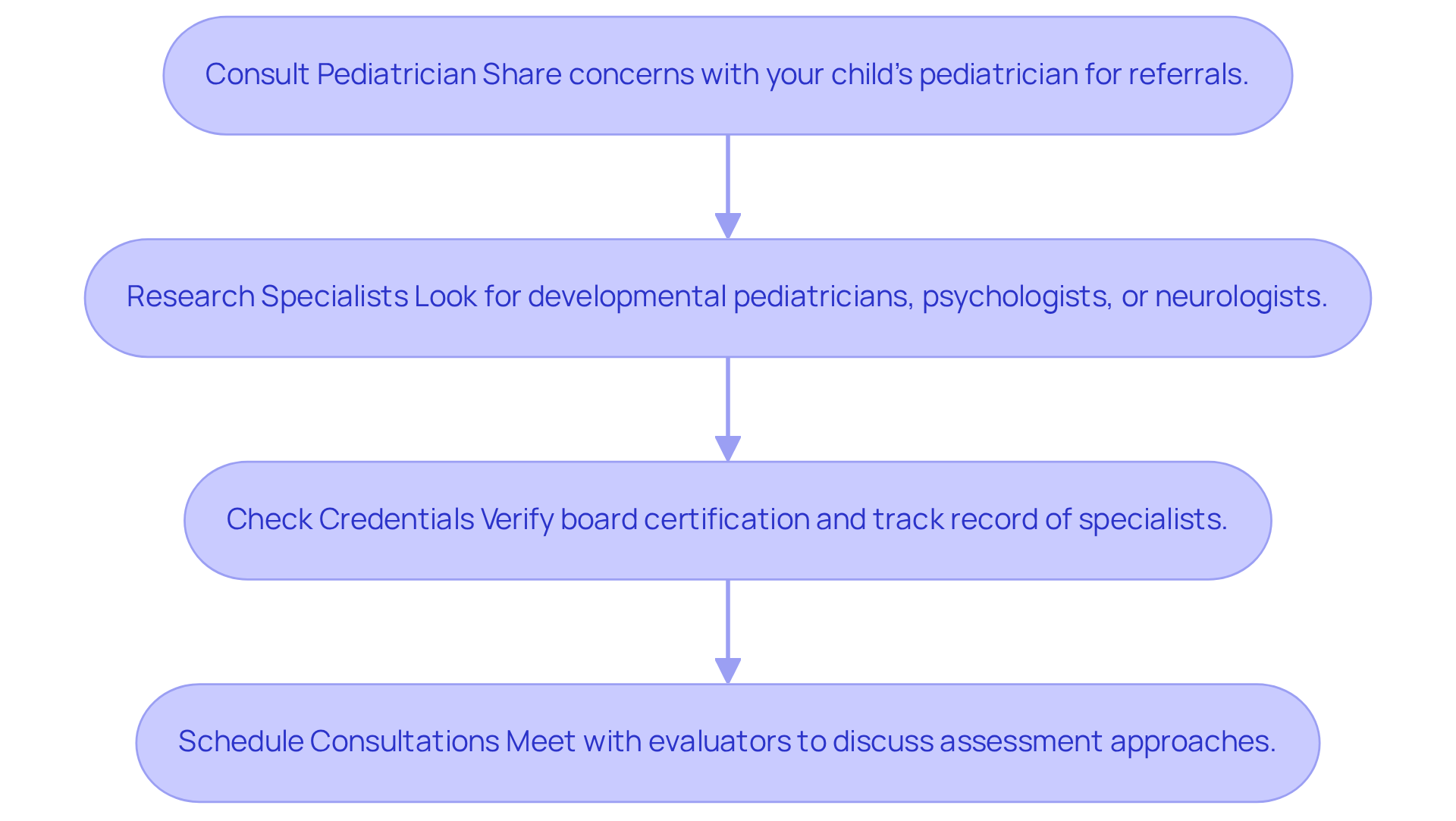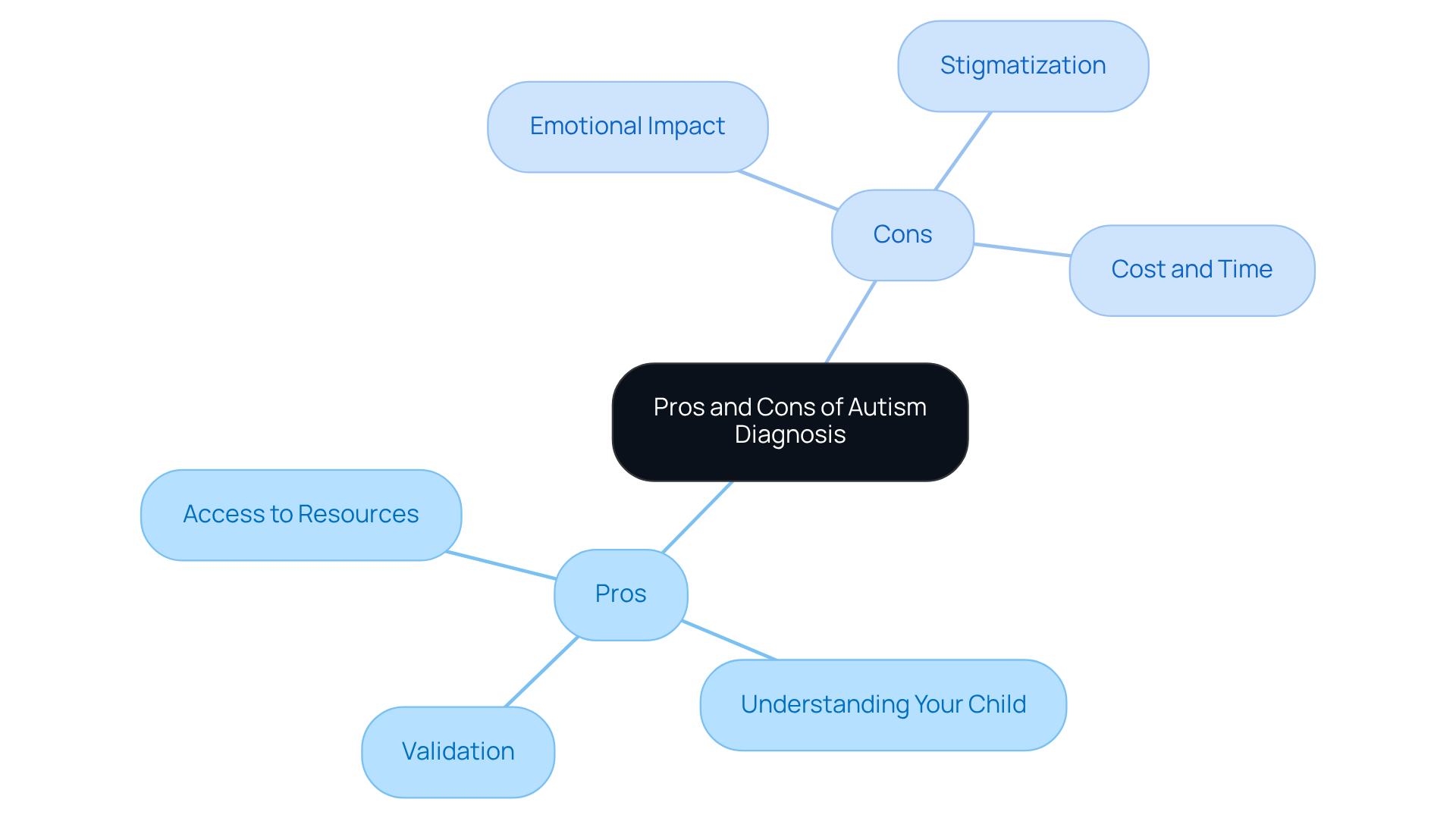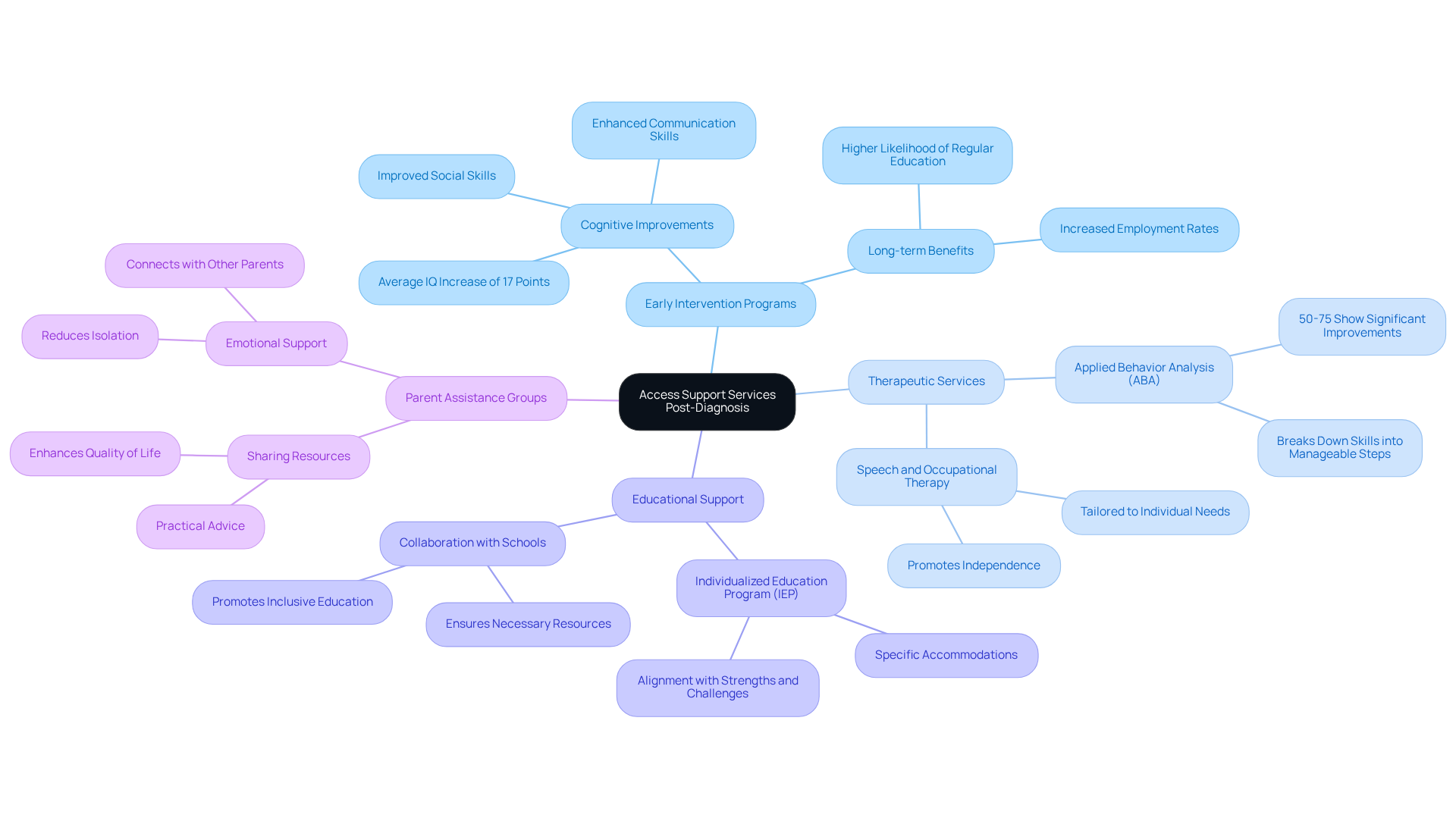Overview
As you embark on the journey to obtain an autism diagnosis for your child, it's essential to start by familiarizing yourself with the diagnostic criteria. Consulting healthcare professionals, such as pediatricians, can be a crucial first step, as they can provide referrals to qualified specialists who understand your child's unique needs.
Understanding the importance of early intervention can be transformative. Accessing various support services not only helps in obtaining a formal diagnosis but also opens doors to tailored therapies and educational resources. These resources can significantly enhance developmental outcomes for children with autism, paving the way for a brighter future.
We encourage you to take action and seek the support you need. Remember, you are not alone in this journey—many parents have walked this path and can share their experiences. Engaging with a community of understanding individuals can provide comfort and guidance as you navigate this process together.
Introduction
Navigating the journey toward an autism diagnosis for a child can feel daunting and overwhelming for many parents. With approximately 1 in 31 children in the U.S. affected by Autism Spectrum Disorder (ASD), it is crucial to understand the diagnostic criteria and available resources for timely intervention. This guide offers a clear roadmap, outlining essential steps to secure a diagnosis, locate qualified professionals, and evaluate the benefits and challenges of the process.
As families embark on this path, they often grapple with a pressing question: how can they ensure they are making the best decisions for their child's future amidst the complexities of the diagnostic landscape? Together, we can explore these concerns and find the support you need.
Understand Autism Diagnostic Criteria and Resources
To start the process of where to get autism diagnosis for your child, it’s essential to familiarize yourself with the diagnostic standards outlined in the DSM-5. Autism Spectrum Disorder (ASD) is marked by ongoing challenges in social communication and interaction, along with restricted and repetitive behaviors. Here are some key resources that can guide you:
- CDC Autism Screening: The CDC offers comprehensive guidelines on developmental screening and underscores the critical nature of early identification. It’s important to note that the average age for initial intervention in the U.S. is 4.7 years, which emphasizes the urgency for timely action. Additionally, approximately 1 in 31 children in the U.S. has a developmental disorder, highlighting the necessity for awareness and proactive steps. For further details, visit CDC Autism Screening.
- Autism Speaks: This organization provides a wealth of information on identifying developmental disorders, including the criteria used by healthcare professionals. Explore their resources at Autism Speaks Diagnosis.
- Local Support Groups: Connecting with local autism support groups can be incredibly beneficial. These groups offer insights and shared experiences from other parents navigating the evaluation process. For example, SARRC hosts monthly meetings that provide up-to-date information and resources related to ASD, ensuring parents feel informed and supported.
- Expert Insight: Dr. Christopher J. Smith, a prominent specialist in the field, notes that 'autism begins with a disruption in the learning process, where young individuals don’t absorb information from their surroundings as effectively as typically developing individuals.' This statement underscores the importance of early diagnosis and intervention.
Understanding these resources and the diagnostic criteria is crucial for parents who want to know where to get autism diagnosis in order to ensure their child receives the necessary evaluation and support. Remember, you are not alone in this journey, and seeking help is a strong step towards fostering your child’s development.

Locate Qualified Professionals for Assessment
Once you grasp the diagnostic criteria, the next step is to understand where to get autism diagnosis from qualified professionals who can conduct the assessment. Here’s a gentle guide to help you through this journey:
- Consult Your Pediatrician: Begin by sharing your concerns with your child's pediatrician. They play a crucial role in the diagnostic process and can provide referrals to specialists skilled in evaluations related to developmental disorders.
- Research Specialists: Seek out developmental pediatricians, youth psychologists, or neurologists who focus on evaluations for developmental disorders. Organizations like the Autism Society can assist you in finding local providers who fit your needs.
- Check Credentials: Ensure that the professionals you consider are board-certified and have a strong track record in diagnosing developmental disorders. You can verify their credentials through professional organizations or state licensing boards, ensuring they adhere to the highest standards of practice.
- Schedule Consultations: Arrange meetings with potential evaluators to discuss their assessment approach and ensure it aligns with your family’s needs. This step is vital for establishing a comfortable and supportive atmosphere for your child.
As we look ahead to 2025, the number of qualified professionals for autism assessment in the U.S. is increasingly critical, given the rising prevalence of autism, which affects approximately 1 in 31 children. Engaging with pediatricians not only facilitates referrals but also helps families know where to get autism diagnosis and receive comprehensive support throughout the diagnostic journey. There are numerous success stories where pediatricians have effectively guided families to specialists, resulting in timely and accurate evaluations—essential for early intervention and improved outcomes.

Evaluate the Pros and Cons of Diagnosis
Before moving forward with the assessment, it’s essential to thoughtfully consider the pros and cons of obtaining an autism diagnosis:
Pros:
- Access to Resources: A formal diagnosis can open doors to specialized therapies, educational support, and community resources that can significantly benefit your child.
- Understanding Your Child: An assessment can illuminate your child's behavior and needs, enabling you to tailor your approach to foster their development effectively.
- Validation: Many parents experience relief in receiving an assessment, as it affirms their concerns and experiences, providing a sense of understanding.
Cons:
- Emotional Impact: Receiving a diagnosis can be overwhelming, often leading to feelings of grief or anxiety about what lies ahead.
- Stigmatization: There can be societal stigma surrounding the condition, which may affect how others perceive your child.
- Cost and Time: The diagnostic process can be both lengthy and costly, often requiring multiple appointments and assessments.
As you reflect on these factors, consider discussing them with your support network or a mental health professional. They can help you navigate your feelings and explore the best path forward.

Access Support Services and Resources Post-Diagnosis
After receiving an autism diagnosis, it is crucial to know where to get autism diagnosis and access appropriate support services for your child's development and well-being.
- Early Intervention Programs: It's crucial to seek out early intervention services that provide tailored support for youngsters with autism. Research indicates that early intervention can lead to significant improvements in developmental outcomes. Young individuals often demonstrate enhanced communication and social skills. Moreover, those who receive early intervention can boost their IQ by an average of 17 points, showcasing the cognitive advantages of starting early.
- Therapeutic Services: Consider enrolling your child in Applied Behavior Analysis (ABA) therapy, speech therapy, or occupational therapy based on their individual needs. ABA therapy, in particular, has been shown to enhance cognitive and adaptive functioning in 50-75% of young individuals who receive intensive treatment for two or more years. This approach breaks down complex skills into manageable steps, reinforcing positive behaviors and fostering independence.
- Educational Support: Collaborating with your child's school to create an Individualized Education Program (IEP) tailored to their unique learning requirements is essential. An effective IEP should include specific accommodations and assistance strategies that align with your child's strengths and challenges, ensuring they receive the necessary resources to thrive in an educational setting.
- Parent Assistance Groups: Engaging with local or online groups can connect you with other parents navigating similar experiences. Sharing insights and resources can provide emotional encouragement and practical advice, helping you feel less isolated on this journey. Many parents report that these connections significantly enhance their quality of life and reduce stress levels. In fact, over 80% of families experience these benefits after participating in early intervention programs.
By prioritizing these support services, you can help your child unlock their potential and navigate the challenges associated with autism more effectively. As Fayge Orzel wisely states, "Early intervention is a cornerstone of successful outcomes for children with Autism Spectrum Disorder (ASD).

Conclusion
Understanding where to obtain an autism diagnosis for your child is a crucial step in ensuring they receive the support they need. This journey involves familiarizing yourself with diagnostic criteria, locating qualified professionals, weighing the pros and cons of a diagnosis, and accessing essential support services after the diagnosis. By navigating these steps, you can empower yourself to advocate effectively for your child's developmental needs.
Key points to consider include:
- The importance of early identification of Autism Spectrum Disorder (ASD)
- The vital role pediatricians play in facilitating referrals to specialists
- The various resources available to families
This discussion emphasizes the emotional and practical implications of obtaining a diagnosis, highlighting significant benefits such as access to tailored therapies and educational support while also acknowledging the potential challenges that may arise.
Ultimately, obtaining an autism diagnosis is not merely about labeling a condition; it is about unlocking opportunities for growth and development. You are encouraged to take proactive steps, seek out necessary resources, and connect with support networks. By doing so, you can foster a nurturing environment that promotes your child's potential and well-being, paving the way for a brighter future.
Frequently Asked Questions
What are the main characteristics of Autism Spectrum Disorder (ASD)?
Autism Spectrum Disorder (ASD) is characterized by ongoing challenges in social communication and interaction, along with restricted and repetitive behaviors.
Why is early identification of autism important?
Early identification is crucial because the average age for initial intervention in the U.S. is 4.7 years. Timely action can significantly impact a child's development.
What resources are available for autism screening and diagnosis?
Key resources include the CDC Autism Screening guidelines, Autism Speaks for information on identifying developmental disorders, and local support groups for shared experiences and insights.
What does the CDC recommend regarding autism screening?
The CDC emphasizes the importance of comprehensive developmental screening and early identification of autism to ensure timely intervention.
How can local support groups assist parents seeking an autism diagnosis for their child?
Local support groups provide insights and shared experiences from other parents, helping them navigate the evaluation process and access up-to-date information and resources related to ASD.
Who is Dr. Christopher J. Smith and what is his perspective on autism?
Dr. Christopher J. Smith is a prominent specialist in the field who notes that autism begins with a disruption in the learning process, affecting how young individuals absorb information from their surroundings.
What should parents keep in mind when seeking an autism diagnosis for their child?
Parents should understand the diagnostic criteria and available resources, and remember that seeking help is an important step towards supporting their child's development.




